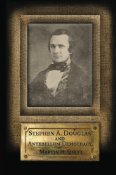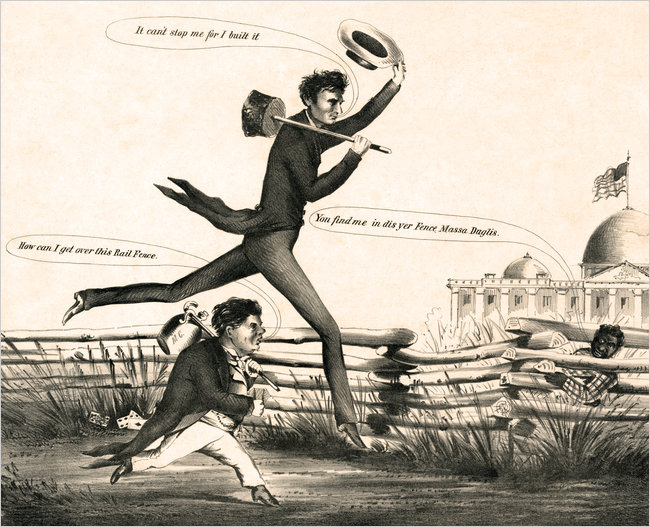
Stephen A. Douglas and Antebellum Democracy By Martin H Quitt
 Stephen A. Douglas and Antebellum Democracy
Stephen A. Douglas and Antebellum Democracy
By Martin H Quitt
This book is part biography and part social and political history. Quitt draws on previously untapped sources to try to do justice to a complex man now little more than a footnote to history. The irony is that, in his time, Douglas was widely admired and thought much more likely to ascend to the presidency than the man whose election relegated him to the shadows. If Douglas is remembered at all, it is for debating Lincoln in 1858 when Lincoln ran for Douglas’s Senate seat. Lincoln is reputed to have won the debates, but Douglas won the election.
By turns Douglas was prodigy, opportunist, pragmatist, patriot and more. Regarding the prodigy, the author draws on three different versions of Douglas’s early years in Vermont. Predictably, Douglas’s autobiography (written when he was 25) is more flattering to its author than his older sister’s memories of the same period.
The facts, if not the motivations behind them, are that Douglas was a gifted boy, unwilling at 14 to pursue further schooling, despite his mother’s wish that he do so. Instead, he apprenticed himself to a cabinetmaker in a neighboring town. The apprenticeship lasted less than a year because, according to Douglas’s account, he refused the cabinet-maker’s request to perform “some menial service in the house.†Another apprenticeship, this one cut short by illness, resulted in a physician’s advice that Douglas was “too feeble†to be a cabinetmaker and should seek another vocation. At that point Douglas returned to school.
His biographers agree on one fact. Douglas lacked the physical stamina for carpentry. He was only 5 ft 4 inches tall and weighed perhaps 100 pounds, but his ambition was king-sized. He decided to become a lawyer but lacked the patience to pursue a law degree in the conventional manner. After two more years of schooling in New York, where the family had moved after his widowed mother’s remarriage, he joined the Hubbell law firm. After 6 months he despaired of another four years before he could qualify as an attorney. He determined that it was much easier to become a full-fledged legal practitioner in “the great west †where the requirements were much less demanding.
He would settle where he could become a lawyer the fastest and where he would not have to compete with the credential of his legal mentor in Canandaigua, Walter Hubbell, who graduated from Union college.
Douglas moved to Cleveland and began a year of legal study with a local attorney to satisfy the Ohio requirement. However, illness intervened again and, when recovered, he moved on, finally settling in Jacksonville, Illinois. There attorney Murray McConnel advised him that obtaining a law “license was a matter of no consequence, that I could practice before a justice of the peace without one, and could get one at any time I desire to do so.â€
His lack of constancy seems anything but admirable. Yet, as the author points out, Douglas had a prodigious intellect when sufficiently motivated to employ it. He undertook a self-study regimen that encompassed reading “congressional debates reported in newspapers and a number of political books.â€
Before he was old enough to vote, Douglas had immersed himself in all of the available printed records surrounding the ratification of the Constitution and the constitutionality of the national bank, the great issue of Andrew Jackson’s second term.
Samuel Lockwood, justice on the Illinois Supreme Court, licensed the 20-year-old  Douglas as a lawyer in 1834, despite commenting, “Douglas was not as prepared as he should have been.†The new lawyer then opened his law office.
Douglas’s political career commenced on March 29, 1834. That was the day he delivered a one-hour speech at the Jacksonville Courthouse to defend Jackson’s war on the national bank. The speech gained him notoriety in the anti-Jackson press and the attention of fellow Democrats. Within months he was a mover and shaker within the new Democratic Party of Illinois.
He was appointed as one of the state’s attorneys in 1835 but did not finish his term. In 1836 he ran and won election to the state legislature where he served along with Abraham Lincoln. Again he did not complete his term but resigned to accept President Van Buren’s appointment as register of the Federal Land Office in Springfield. Eight months later he was (an unsuccessful) candidate for Congress.
Explaining this meteoric rise the author writes that Douglas was both “charismatic†and calculating. By his own admission, Douglas did not have time for “personal friends†only for “political friends†whose solicitation for votes he credited with pushing him ahead. Similar to a Democrat politician in our time, Douglas “bathed in the adoration of the crowd, which gave him what he did not get from private relationships.â€
The similarity goes even further.
Douglas was shrewd. Taking the time at age 25 to fashion a compelling life narrative itself is evidence of his strategic thinking….He undertook the writing of his biography in order both to preserve his story and to connect it with the electorate. Those two ends were not inconsistent for someone whose very identity was now intimately tied to the people he needed.
In addition to charisma, Douglas displayed a physicality with his audiences that is difficult to imagine even in today’s permissiveness culture. “He would “sit on the laps of men†and “clap them on their backs.†The author explains this behavior was not sexual but “within the context of the egalitarian ethos of his times…It signified that the ‘Little Giant’ did not think himself so high and mighty that he could not repose on a man’s knees. It figuratively brought him down to the level of his peers.†It was part of his public performance.
Douglas was named to the Illinois Supreme Court in 1841 but did not serve out his term, although thereafter he preferred to be addressed as Judge Douglas. He was elected to US House of Representatives in1843 and became a U.S Senator in 1846 where he served until his death at age 48.
Antebellum lawmakers at the state and federal levels needed to know the written constitution applicable to their jurisdiction. This was the great legacy of the founders of the Republic: congressmen were obliged to justify their positions in terms of the Constitution.
The author writes, “His legislative record over seventeen years in Congress was anchored in constitutionalism.†The difference between the Democrat party then and now could not be more stark.
Douglas was rooted in his conviction that the federal government should respect the diversity of states and territories and the slavery issue should be democratically decided in those locales. He was a member of the powerful Committee on the Territories in the US Senate where he moved major legislation involving the new western territories. He helped pass the Compromise of 1850 and was the architect of the Kansas-Nebraska Act in 1854, dealing with slavery in the new territories.
Historians, writing from the vantage point of more enlightened times, have condemned Douglas for his belief in the inferiority of the black race. However, it was a belief shared by most of the antebellum generation and, as Thomas Fleming points out in his book â€A Disease in the Public Mind†by Thomas Jefferson.
The morality of slavery did not concern Douglas. Lincoln, who was pressed during the debates to deny the charge that he believed in equality of the races, was convinced that slavery was morally wrong. He challenged Douglas to declare himself on the moral issue. Douglas refused to do so.
’Lincoln tells you that I will not argue the question whether slavery is right or wrong. I tell you I will not do it. I hold under the Constitution of the United States, each state of the Union has a right to do as it pleases on the subject of slavery.’
Which was the greater sin, secession or slavery? To Douglas the answer was clear. He denounced the proposition to dissolve the American Union as ‘moral treason.’ For more than a decade he foresaw civil war if the question of slavery in the territories was controlled by the ultras on either side. He wanted to remove the issue from Washington politics because it endangered national coherence. He believed the overriding purpose of the Constitution had been to achieve the Union; therefore, its preservation was the highest constitutional value.
Douglas’s vaunted ambition peaked with his desire to be president. Having won the candidacy of a splintered Democratic Party he undertook the first overtly political presidential campaign. The custom against personal campaigning by presidential candidates dated from George Washington who considered it improper to openly pursue election and detrimental to the dignity of the office. Douglas’s decision to ignore it was risky. The conventional wisdom was that “talking and touring could only hurt the candidate.â€
Douglas campaigned openly and energetically in both the North and South, the latter at considerable personal risk. When in the North he attacked abolitionism and in the South he spoke against disunion. But his consistent message, regardless of audience, was that the people in the states and territories should decide the slavery issue without federal interference. He visited 24 states, drawing enormous crowds. It was a remarkable feat in an age lacking today’s communication technology and transportation options.
But for all his energy and effort, Quitt’s analysis shows â€little correlation between Douglas’s personal campaigning and his performance Election Day.†This lack of connection “reveals an important fact of antebellum democracy – the widespread acceptance of the president as a leader who did not subject himself to screening by the people.†The crowds that flocked to Douglas sought entertainment, not political enlightenment.
After losing to Lincoln, Douglas declared his support for the president and attempted to find compromises that would stop secession. But, as the author points out, the patriotic Douglas did not eclipse the shrewd politician.
Douglas was eager to make visible his rapport with the new administration and at the same time make clear that he remained an important player.
Lincoln, however, was no novice at the political game.
Each was ready to use the other: Douglas wanted to be in the president’s inner circle; Lincoln wanted the Democratic standard bearer to broaden support for succession.
Quitt extracts Douglas from Lincoln’s shadow and succeeds in illuminating both the man and his time. This is a compelling book that challenges each reader to decide Stephen Douglas’s proper place in history.

 The posts are coming!
The posts are coming!

0 comments
Kick things off by filling out the form below.
Leave a Comment